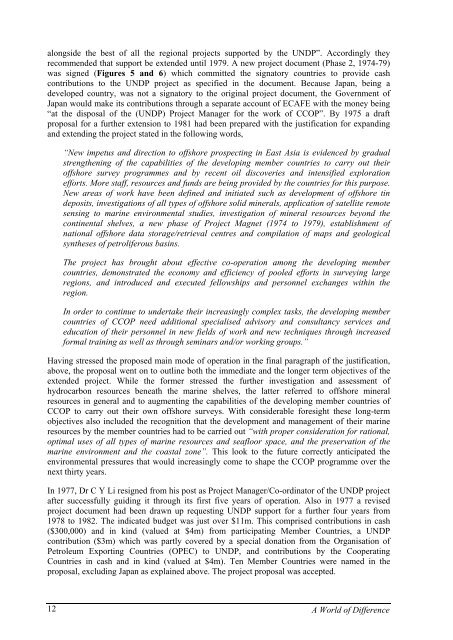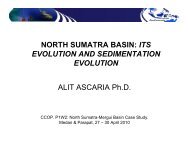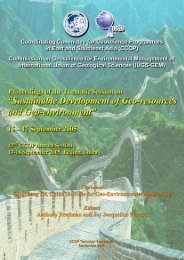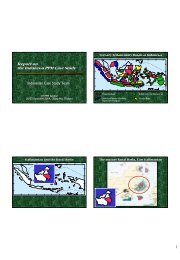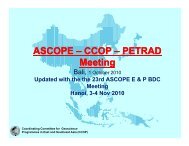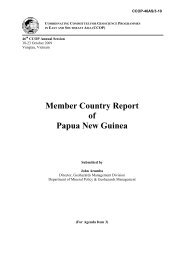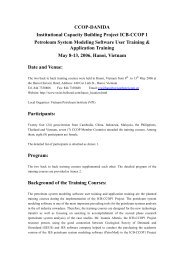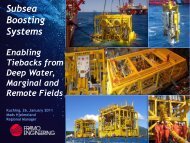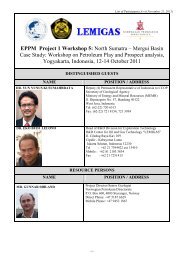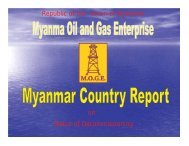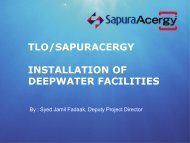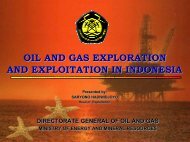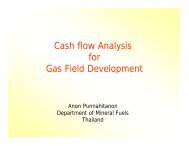Forty Years Of The Coordinating Committee For Geoscience - CCOP
Forty Years Of The Coordinating Committee For Geoscience - CCOP
Forty Years Of The Coordinating Committee For Geoscience - CCOP
Create successful ePaper yourself
Turn your PDF publications into a flip-book with our unique Google optimized e-Paper software.
alongside the best of all the regional projects supported by the UNDP”. Accordingly they<br />
recommended that support be extended until 1979. A new project document (Phase 2, 1974-79)<br />
was signed (Figures 5 and 6) which committed the signatory countries to provide cash<br />
contributions to the UNDP project as specified in the document. Because Japan, being a<br />
developed country, was not a signatory to the original project document, the Government of<br />
Japan would make its contributions through a separate account of ECAFE with the money being<br />
“at the disposal of the (UNDP) Project Manager for the work of <strong>CCOP</strong>”. By 1975 a draft<br />
proposal for a further extension to 1981 had been prepared with the justification for expanding<br />
and extending the project stated in the following words,<br />
“New impetus and direction to offshore prospecting in East Asia is evidenced by gradual<br />
strengthening of the capabilities of the developing member countries to carry out their<br />
offshore survey programmes and by recent oil discoveries and intensified exploration<br />
efforts. More staff, resources and funds are being provided by the countries for this purpose.<br />
New areas of work have been defined and initiated such as development of offshore tin<br />
deposits, investigations of all types of offshore solid minerals, application of satellite remote<br />
sensing to marine environmental studies, investigation of mineral resources beyond the<br />
continental shelves, a new phase of Project Magnet (1974 to 1979), establishment of<br />
national offshore data storage/retrieval centres and compilation of maps and geological<br />
syntheses of petroliferous basins.<br />
<strong>The</strong> project has brought about effective co-operation among the developing member<br />
countries, demonstrated the economy and efficiency of pooled efforts in surveying large<br />
regions, and introduced and executed fellowships and personnel exchanges within the<br />
region.<br />
In order to continue to undertake their increasingly complex tasks, the developing member<br />
countries of <strong>CCOP</strong> need additional specialised advisory and consultancy services and<br />
education of their personnel in new fields of work and new techniques through increased<br />
formal training as well as through seminars and/or working groups.”<br />
Having stressed the proposed main mode of operation in the final paragraph of the justification,<br />
above, the proposal went on to outline both the immediate and the longer term objectives of the<br />
extended project. While the former stressed the further investigation and assessment of<br />
hydrocarbon resources beneath the marine shelves, the latter referred to offshore mineral<br />
resources in general and to augmenting the capabilities of the developing member countries of<br />
<strong>CCOP</strong> to carry out their own offshore surveys. With considerable foresight these long-term<br />
objectives also included the recognition that the development and management of their marine<br />
resources by the member countries had to be carried out “with proper consideration for rational,<br />
optimal uses of all types of marine resources and seafloor space, and the preservation of the<br />
marine environment and the coastal zone”. This look to the future correctly anticipated the<br />
environmental pressures that would increasingly come to shape the <strong>CCOP</strong> programme over the<br />
next thirty years.<br />
In 1977, Dr C Y Li resigned from his post as Project Manager/Co-ordinator of the UNDP project<br />
after successfully guiding it through its first five years of operation. Also in 1977 a revised<br />
project document had been drawn up requesting UNDP support for a further four years from<br />
1978 to 1982. <strong>The</strong> indicated budget was just over $11m. This comprised contributions in cash<br />
($300,000) and in kind (valued at $4m) from participating Member Countries, a UNDP<br />
contribution ($3m) which was partly covered by a special donation from the Organisation of<br />
Petroleum Exporting Countries (OPEC) to UNDP, and contributions by the Cooperating<br />
Countries in cash and in kind (valued at $4m). Ten Member Countries were named in the<br />
proposal, excluding Japan as explained above. <strong>The</strong> project proposal was accepted.<br />
12<br />
A World of Difference


